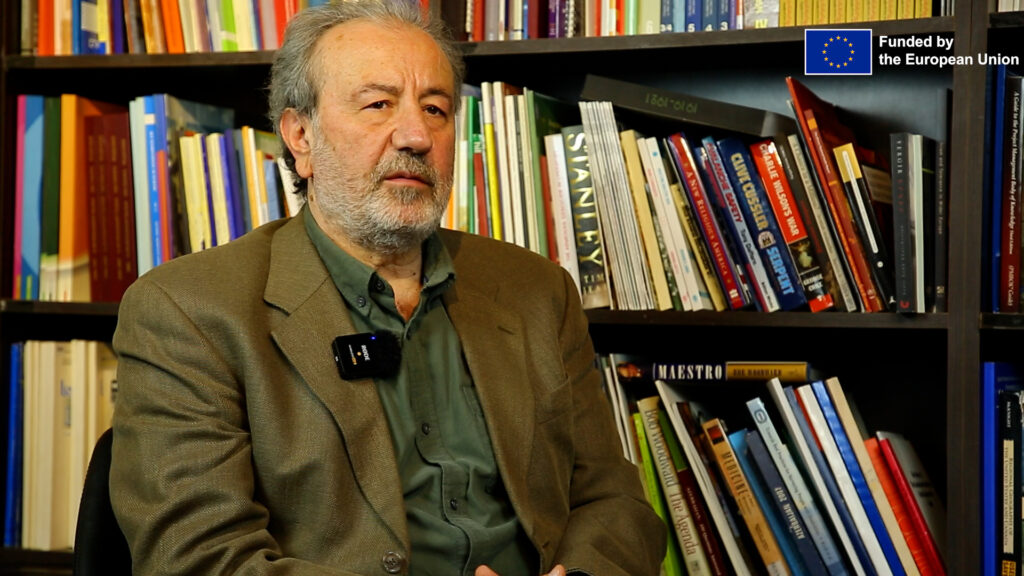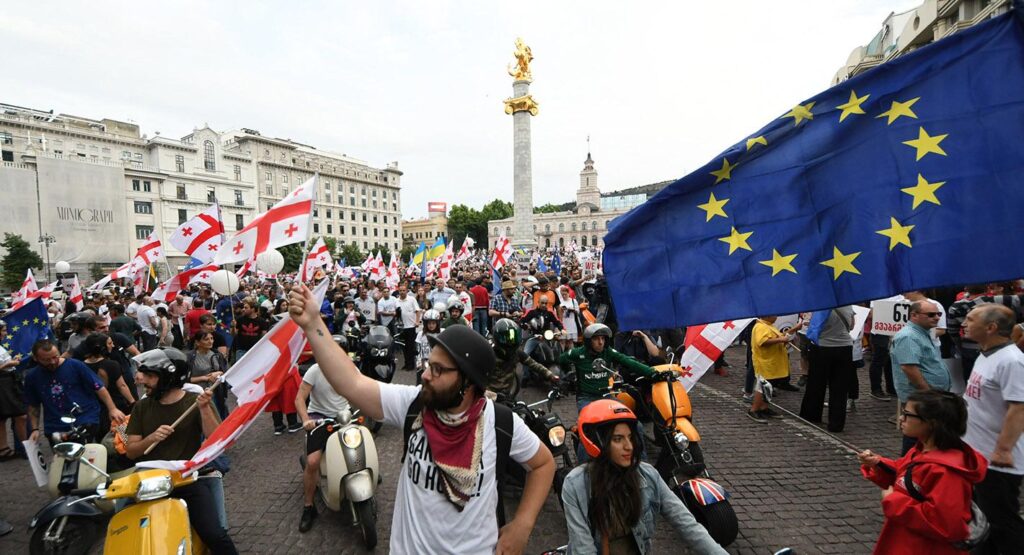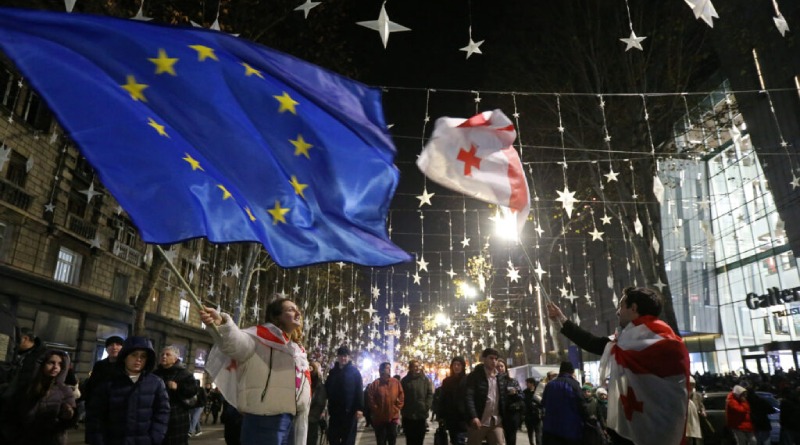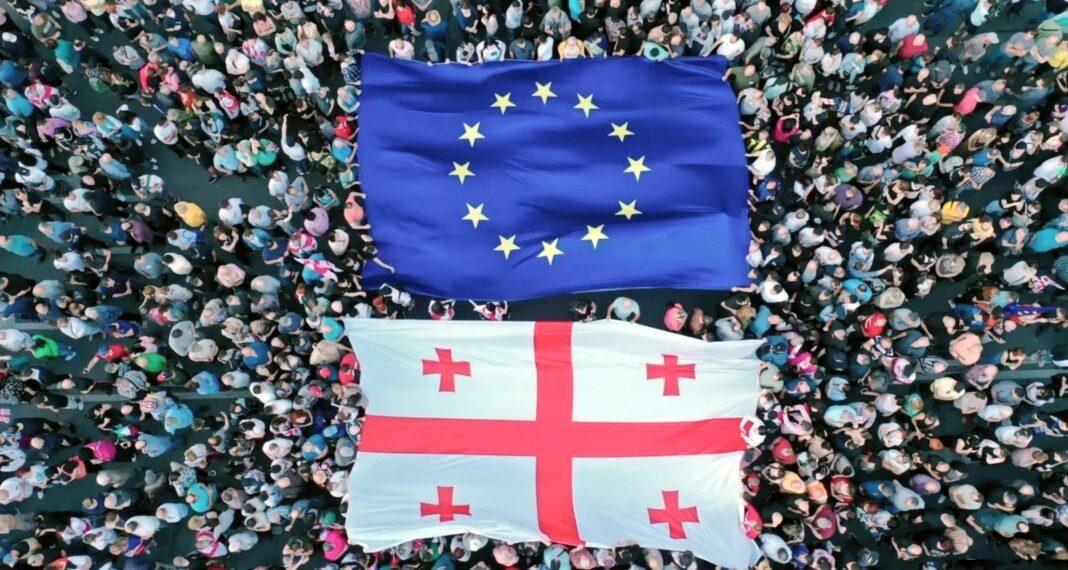Recent events in Georgia, including the controversial “Transparency Law,” have sparked many opinions. The government emphasizes sovereignty and evades externally imposed directives, while opponents argue that it is impossible to live in a community without considering others’ rules and interests.
We discussed this topic and the benefits of European integration with Kakha Gogolashvili, Director of the Center for European Studies.

The European Union is the most developed and sophisticated society with the most modern form of governance. If the contemporary world strives for democracy and human rights and establishes the rule of law, the EU will be at the forefront.
Some forces think this is not the best form of governance, but practice shows that where there is democracy, there is no war. The EU’s primary value is that countries participating in European or Euro-Atlantic integration do not go to war with each other. This indicates that different stimuli operate there, society develops differently, and energy is used in other directions.
Second, all these countries are focused on the well-being of the individual. No one is ignored. What is European democracy? First and foremost, inclusive democracy. Suppose Greek democracy meant majority rule, which many here, unfortunately, understand as having the right to do everything and ignore others. In that case, European democracy means that the rights of all kinds of minorities who do not have direct influence in representative institutions must be protected, studied, and met as much as possible. This is a significant achievement of the EU, and joining it means uniting with these values and establishing them.
Today, it is relevant to discuss to what extent EU membership requires adherence to its proposals or directives and how much space for sovereignty it leaves.

It is essential to understand the term sovereignty. Sovereignty means free will—the will of the country, not its ruler. Of course, when a country enters any international agreement or organization with rules and joins these rules, it transfers part of its sovereignty. Absolute sovereignty belongs only to a country isolated from the global community.
Just as a person with no family does what they want, they follow specific rules when living in a family. If this means losing sovereignty, then it is a mistaken view. Here, sovereignty is distributed, creating collective sovereignty, and the agreement is voluntary.
When you join the Council of Europe and commit to implementing conventions, you benefit from it. In return, you promise to follow the same rules. Someone might say this is a loss of sovereignty and question why we need the Council of Europe. But if we leave, other countries will still determine if we uphold human rights, prisoners’ rights, and those values and trust us less. Does our judiciary operate by European standards? Communication, support, investment, and trust diminish.
So, what does it mean? Integrating into the international system strengthens your country’s image, capabilities, and sovereignty.
It is pure demagoguery when our internal decisions oppose international law, and someone says we are a sovereign country and no one should dictate to us from outside. This is nonsense, absurd. If you violate international norms and your law allows it, international norms prevail. It means you are violating your constitution, which has a clause stating that international law has primacy over domestic legislation.
Our integration into international systems, which has been our goal since the 1990s, has been carried out by our sovereign will. Some may not suggest disintegration to strengthen our sovereignty. We make decisions against our sovereignty, violating the constitution and international norms.
You mentioned EU membership avoids wars. Considering we are not in central Europe and Russia disregards agreements, how guaranteed is it to prevent threats?
No one makes agreements with Russia. Deals can be made, as with China, but not agreements. Russia does not uphold agreements; it has already trampled international law. Relying on global agreements to prevent aggression is unrealistic. Russia does not recognize international obligations. There is no point in taking any guarantees from it. Our most crucial security guarantee is the West, specifically the US and the EU, and other partners who respect their word and international norms.
Will the outcome of the Russia-Ukraine conflict, essentially a Russia-West confrontation, play a decisive role in the new geopolitical space?
The Russia-Ukraine war will inevitably change the international order and bring geopolitical changes. The roles and positions of players will change. If Russia wins, territories will be divided, and geopolitics in Europe will change. Security systems will alter strategies, rules, and goals. Our security will be in significant doubt. Russia will have no obstacles to practically occupy or impose a puppet regime and control our foreign policy, as outlined in the Treaty of Georgievsk.
Hopefully, this will not happen. Russia will be defeated, and the international legal order, established step by step since the creation of the UN, will be restored in its best form. Russia’s unlimited force, which exerts pressure and tries to create a pole where it is the ruler, will end, and multilateral, equal cooperation will develop.

What makes Georgia attractive to Europe?
Georgia is beautiful to Europe. First, we are a European nation, and we prove this. For Europe, a country it integrates with must be mentally and value-wise close. Europe, which emerged from Christian civilization, is entirely acceptable to us. Joining the EU and living in a typical home is much easier for us than for many other nations.
We are attractive for several reasons: first, we love democracy and strive to establish democratic values. Additionally, we are geopolitically significant. For Europe, it is essential to have an EU member country in this region that promotes these universal values. Europe wants to expand the space of peace, democracy, human rights, and well-being. Georgia is a supportive country that can play a significant role in radiating these values in the region.
Georgia can significantly influence trade and economic relations as a European and Asian corridor. A state by the Black Sea is also strategically important for Europe’s overall security. However, Europe has other interests. Spreading European values is even more critical for Europe. When these values are easily spread, they become more attractive to Europe.


